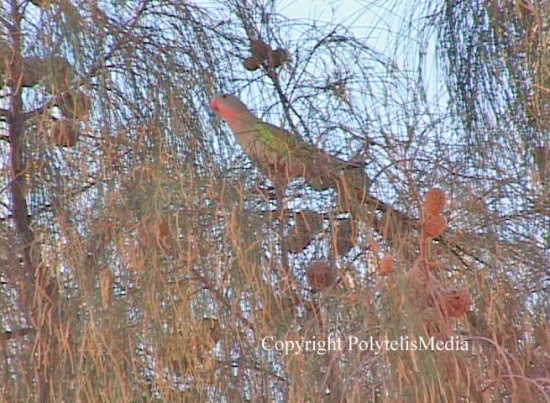m |
(→References: Removed Nationmaster) |
||
| (2 intermediate revisions by 2 users not shown) | |||
| Line 1: | Line 1: | ||
'''Alternative name: Alexandra's Parrot''' | '''Alternative name: Alexandra's Parrot''' | ||
| + | [[Image:Princessmalebirdingausforum2 edited-2.jpg|thumb|550px|right|Male<br />Photo by {{user|Wompoo+Dove|Wompoo Dove}}<br />Gibson Desert, [[Western Australia]], September 2008]] | ||
;[[: Category:Polytelis|Polytelis]] alexandrae | ;[[: Category:Polytelis|Polytelis]] alexandrae | ||
==Identification== | ==Identification== | ||
| − | + | 45 cm (17¾ in)<br /> | |
| − | + | Green overall plumage with a pink throat, bluish crown and rump and bright green shoulders. A long, narrow tail. Their wings have bright green bands on them. They have multi-colored faces with pastel-blue washed foreheads and pink cheeks. Their necks and upper-chests are also rose coloured. | |
| + | |||
| + | The males have longer tail feathers and brighter colouring than females. The male also has a coral-red beak, while the female's is wine-coloured. The male has an orange iris, while the female's is much browner. | ||
==Distribution== | ==Distribution== | ||
Dry eucalyptus forests of interior central and western [[Australia]]. The best bets lately seems to have been in [[Western Australia]], but with only small numbers seen. | Dry eucalyptus forests of interior central and western [[Australia]]. The best bets lately seems to have been in [[Western Australia]], but with only small numbers seen. | ||
| Line 9: | Line 12: | ||
==Taxonomy== | ==Taxonomy== | ||
| − | This is a monotypic species. | + | This is a [[Dictionary_M-S#M|monotypic]] species<sup>[[#References|[1]]]</sup>. |
==Habitat== | ==Habitat== | ||
It inhabits arid woodland and scrub with spinifex, eucalypts, acacias, etc. | It inhabits arid woodland and scrub with spinifex, eucalypts, acacias, etc. | ||
| Line 17: | Line 20: | ||
Four to six rounded white eggs are laid in a hollow in a eucalypt or desert oak. | Four to six rounded white eggs are laid in a hollow in a eucalypt or desert oak. | ||
====Diet==== | ====Diet==== | ||
| − | They feed on the seeds of grasses and shrubs. | + | They feed on the seeds of grasses, spinifex and shrubs. |
==References== | ==References== | ||
| − | #{{Ref- | + | #{{Ref-Clements6thAug15}}#Handbook of the Birds of the World Alive (retrieved August 2015) |
| − | # Link to a recent [http://bioacoustics.cse.unsw.edu.au/birding-aus/2008-07/msg00179.html report] of visible Princess Parrots. | + | # Link to a recent [http://bioacoustics.cse.unsw.edu.au/birding-aus/2008-07/msg00179.html report] of visible Princess Parrots. |
| + | |||
==External Links== | ==External Links== | ||
{{GSearch|Polytelis+alexandrae}} | {{GSearch|Polytelis+alexandrae}} | ||
| − | [[Category:Birds]][[Category:Polytelis | + | [[Category:Birds]][[Category:Polytelis]] |
Latest revision as of 16:07, 19 February 2020
Alternative name: Alexandra's Parrot
- Polytelis alexandrae
Identification
45 cm (17¾ in)
Green overall plumage with a pink throat, bluish crown and rump and bright green shoulders. A long, narrow tail. Their wings have bright green bands on them. They have multi-colored faces with pastel-blue washed foreheads and pink cheeks. Their necks and upper-chests are also rose coloured.
The males have longer tail feathers and brighter colouring than females. The male also has a coral-red beak, while the female's is wine-coloured. The male has an orange iris, while the female's is much browner.
Distribution
Dry eucalyptus forests of interior central and western Australia. The best bets lately seems to have been in Western Australia, but with only small numbers seen. Also found in stands of Desert Oak (Allocasuarina decaisneana) with understorey of spinifex in north-western South Australia as recent as May, 2010.
Taxonomy
This is a monotypic species[1].
Habitat
It inhabits arid woodland and scrub with spinifex, eucalypts, acacias, etc.
Behaviour
Nomadic.
Breeding
Four to six rounded white eggs are laid in a hollow in a eucalypt or desert oak.
Diet
They feed on the seeds of grasses, spinifex and shrubs.
References
- Clements, J. F., T. S. Schulenberg, M. J. Iliff, D. Roberson, T. A. Fredericks, B. L. Sullivan, and C. L. Wood. 2015. The eBird/Clements checklist of birds of the world: v2015, with updates to August 2015. Downloaded from http://www.birds.cornell.edu/clementschecklist/download/
- Handbook of the Birds of the World Alive (retrieved August 2015)
- Link to a recent report of visible Princess Parrots.




